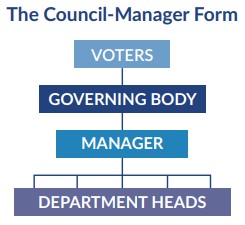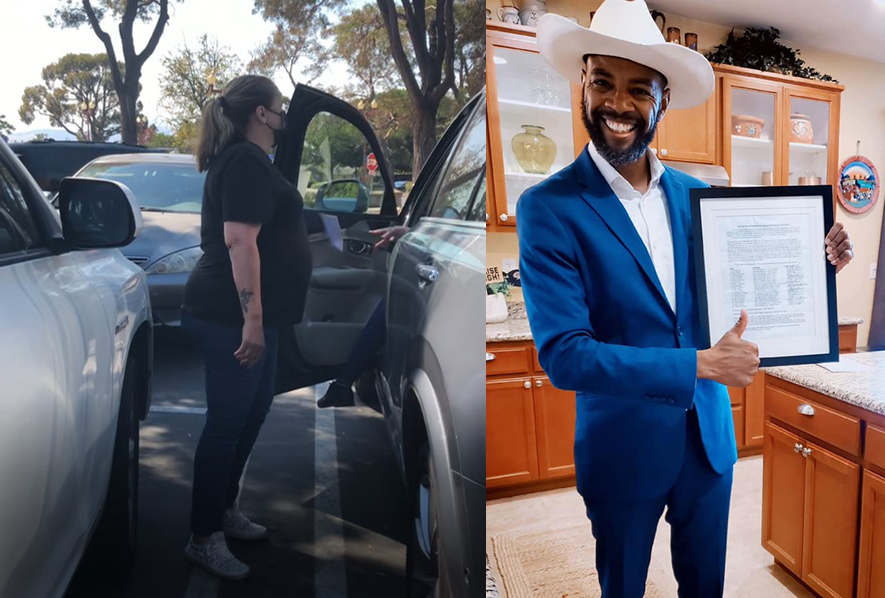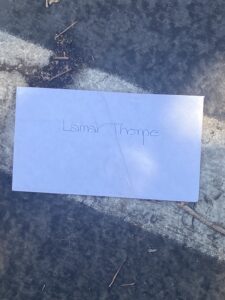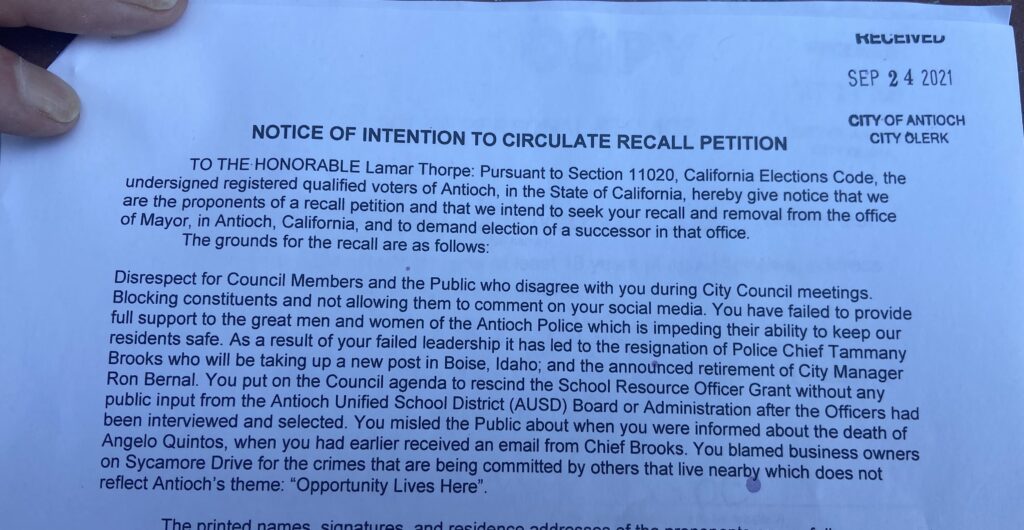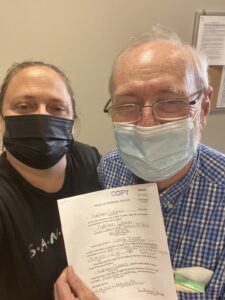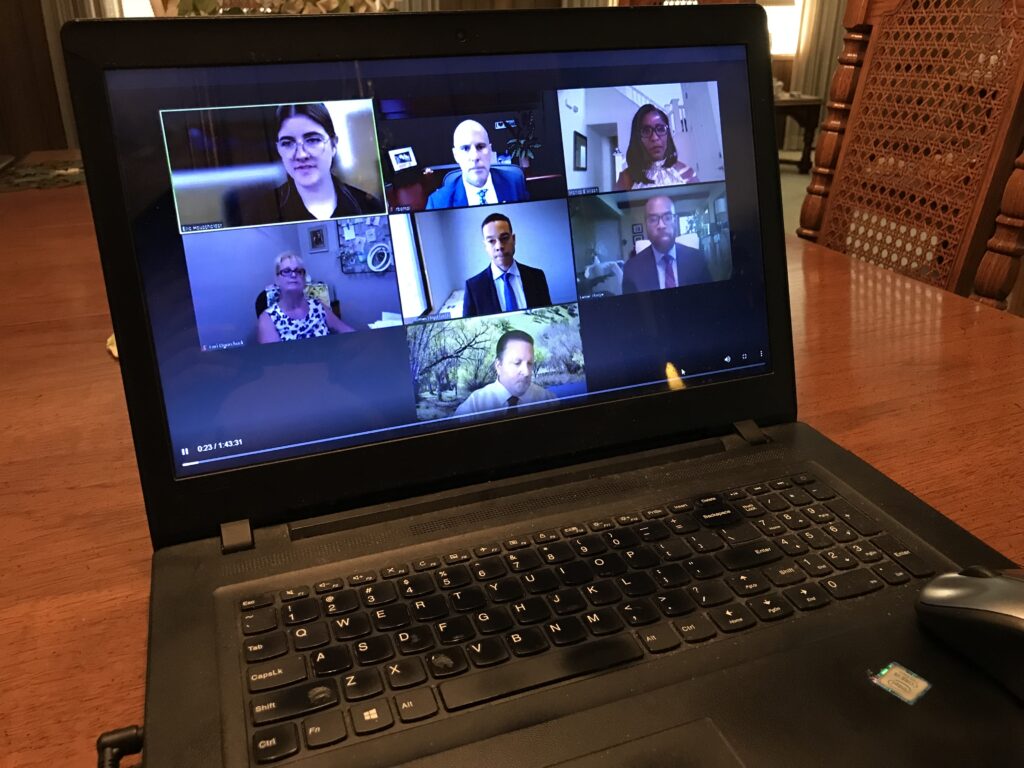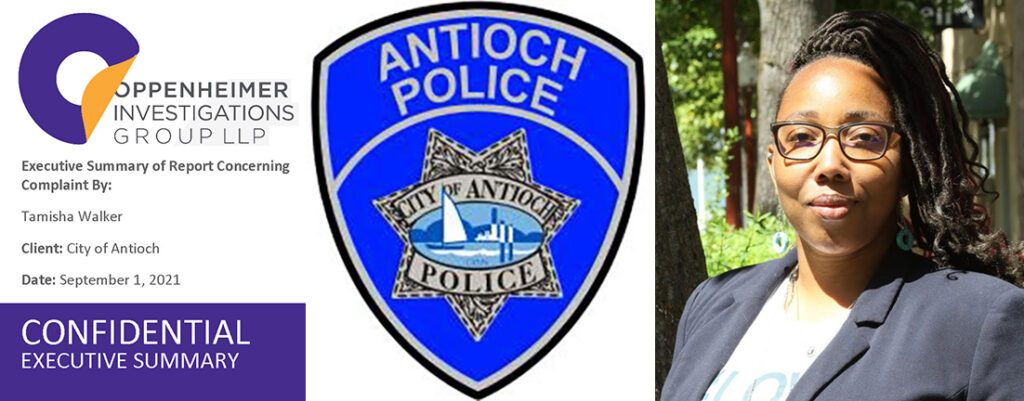
Investigators hired in January following demand by Councilwoman Torres-Walker
By Allen Payton
It began as a routine traffic stop of two brothers riding dirt bikes illegally on Antioch streets. But it turned into an online, anger-filled, profanity-laced diatribe by a newly elected, anti-cop councilwoman, that continued with her demand for an outside investigation and her filing of a formal complaint against the officers. That resulted in the hiring of an independent investigator who produced a report showing all of the councilwoman’s complaints about how she and her sons were mistreated were baseless. (See related articles here, here and here)
Over eight months after the incident between Antioch District 1 Councilwoman Tamisha Torres-Walker, her two sons and police officers occurred on Dec. 29, 2020, and over seven months after she demanded the investigation and filed the formal complaint, the Confidential Executive Summary of the investigative report from the independent investigator, Oppenheimer Investigations Group, has finally been released. It was made available Tuesday night by Antioch Police Chief T Brooks and describes each of the councilwoman’s claims as either “unfounded” or “not sustained”.
The investigation included interviews with Torres-Walker, APD Officers Calvin Prieto and Andrea Rodriguez, and five others, who were not named in the executive summary nor shared by Brooks, as it is a personnel matter. The investigation included video footage and documents. Those are part of the criminal report which is not yet available.
The Executive Summary provides details of what occurred during the traffic stop and confrontation of the officers by Torres-Walker, as well as your complaints and the findings by Vida Thomas of Oppenheimer.
See the six-page here Executive Summary of Report Concerning Complaint Filed by Tamisha Walker and below.
Questions for Torres-Walker
Torres-Walker was asked if she had the chance to read the Executive Summary and if she had any response or comments she wanted to share. In addition, the councilwoman was asked if she had seen the complete report, including the video footage and documents referred to on page 2, below the heading 1. Introduction and Scope?
She did not respond as of publication time.
Q&A With Chief Brooks
Asked if the complete Investigative Report has been provided to Councilwoman Torres-Walker, and/or the mayor and other council members, he responded, “No. They received the same document you did. The full investigative report is part of the officers’ personnel file and is confidential. The executive summary was written specifically to provide publicly available information due to the public interest generated in this case.”
In addition, he was asked if the related video footage and documents were available to the public, what video footage was included in the investigation other than the councilwoman’s online rant and if there was cell phone video of the incident. Brooks responded, “Any/all video gathered regarding this incident is part of the criminal report, which is not yet publicly available.”
The criminal report is about the arrest of Torres-Walker’s older son, Yomani Mapp, for evading police after he didn’t stop, when the police attempted to pull him, over while he was riding a dirt bike. Antioch Police submitted a felony charged against Mapp using Vehicle Code (VC) 2800.4, because he drove in the opposite direction while evading police. He could have faced six months to a year in jail or a fine of $1,000 to $10,000, or both. But Contra Costa DA Diana Becton reduced the charge to a misdemeanor using VC 2800.1(a) for just evading police and, if convicted, Mapp could face up to one year in jail. The filing with the court occurred on March 23, the same day Torres-Walker made a $500 contribution to Becton’s re-election committee, according to the DA’s campaign finance report.
Follow up questions were sent to Brooks asking, “when will the criminal report be publicly available, please? And is it completed?” He responded, “The criminal report has been completed and a complaint was filed by the DA’s office. However, the case has not yet been adjudicated.”
He was also asked if all the witnesses cooperated with the investigation and who were the other five witnesses. Did they include Torres-Walker’s sons, and residents of the nearby homes or other witnesses at or near the scene? “The executive summary is all the information being provided to the public,” Brooks responded. “The details of full investigation cannot be disclosed.”
Finally, he was asked why did it take over seven months to complete and is that common for outside, independent investigations? “Each investigation is unique and the time to complete them varies for differing reasons,” Brooks stated.
Investigation Cost
The contract for the investigation included payment of $420 per hour for the lead investigator, $180 per hour for an editor/writer and $120 per hour for an intern’s time, as well as other related costs of the investigation. Brooks didn’t know how much it cost the city saying, “All legal services are paid through the city attorney’s office.” An email was then sent to City Attorney Thomas Lloyd Smith asking how many hours was spent on the investigation and the total amount the city has paid or will pay. He did not respond before publication time.
09/27/21 UPDATE: The cost to the City of Antioch for the outside investigation was $44,610 the city attorney’s office revealed, today. In addition, they reported it consumed a total of 120.2 hours for the investigator, a writer/editor and an intern to complete their work. A breakdown of their individual costs was also requested of the city attorney’s office. (See article)
CONFIDENTIAL EXECUTIVE SUMMARY
Oppenheimer Investigations Group LLP September 1, 2021
I. INTRODUCTION AND SCOPE
On January 14, 2021, the City of Antioch (“the City”) retained Oppenheimer Investigations Group LLP (“OIG”) to conduct an impartial investigation of Antioch City Councilmember Tamisha Walker’s complaint against Antioch Police Department (“APD”) officers Calvin Prieto and Andrea Rodriguez, who are assigned to APD’s Traffic Unit. Vida Thomas was the principal investigator.
On December 29, 2020, Prieto and Rodriguez, who were on patrol, observed Walker’s two sons, who were 23 years old and 13 years old at the time, riding a motorized, off-road dirt bike and an off-road ATV, respectively. The officers began pursuing the older son. After the pursuit, Prieto and Rodriguez detained the 13-year-old. In a formal complaint filed on January 27, 2021, Walker alleged that Prieto and Rodriguez dangerously pursued her oldest son, tried purposely to hit him with their patrol car, and verbally and physically mistreated the younger son while detaining him.1 (See Exhibit 1.) In an interview with the undersigned, Walker also alleged that both officers spoke discourteously to her younger son before she arrived at the scene, and that Prieto spoke discourteously to her once she arrived.
Once the scope of the investigation was determined and agreed upon, the investigator operated with complete independence as to witness identification, interview content, and preparation of findings. The investigation included interviews with eight witnesses – including Ms. Walker, Officer Prieto and Officer Rodriguez – a review of video footage, and a review of documents.
This is a Confidential Executive Summary of an Investigative Report. It is anticipated that this Report will be maintained confidentially by the decision-makers and will not be disseminated except as required by law or as determined by the decision-makers.
II. FINDINGS
At the request of APD, the investigator used the following findings used in APD administrative investigations, pursuant to Policy 1011.6.3. Thus, the investigator used these findings where applicable:
Unfounded – When the investigation discloses that the alleged acts did not occur or did not involve department members. Complaints that are determined to be frivolous will fall within the classification of unfounded (Penal Code § 832.8).
Exonerated – When the investigation discloses that the alleged act occurred but that the act was ustified, lawful and/or proper.
Not sustained – When the investigation discloses that there is insufficient evidence to sustain the complaint or fully exonerate the member.
Sustained – A final determination by an investigating agency, commission, board, hearing officer, or arbitrator, as applicable, following an investigation and opportunity for an administrative appeal pursuant to Government Code § 3304 and Government Code § 3304.5 that the actions of an officer were found to violate law or department policy (Penal Code § 832.8).
No Finding – The complainant failed to disclose promised information to further the investigation; the investigation revealed another agency was involved, and the complaint or complainant has been referred to that agency; the complainant wishes to withdraw the complaint or the complainant is no longer available for clarification.
A. FINDINGS CONCERNING OFFICER PRIETO
1. Did Officer Prieto engage in racial profiling of Walker’s sons? (Policy 401.3 – Bias- Based profiling Prohibited)
Not sustained. A preponderance of the evidence did not support a finding that Prieto engaged in racial profiling of Walker’s sons.
The evidence showed that, while patrolling along A Street as a normal part of their traffic enforcement duties, Prieto and Rodriguez saw Walker’s sons riding a dirt bike and an ATV on the wrong side of the street towards oncoming traffic, and creating a traffic hazard. The evidence also showed that Prieto and Rodriguez had a legitimate law enforcement reason, unrelated to race, for pursuing Walker’s sons.
2. Did Officer Prieto engage in a racially biased use of force towards either son? (Policy 300.2.2 – Fair and Unbiased Use of Force)
Unfounded. A preponderance of the evidence did not support a finding that Prieto engaged in a racially biased use of force towards Walker’s sons. That evidence did not support a finding that Prieto tried to hit the older son with the patrol vehicle or run him off the road; had his hand on his taser as he exited the patrol car after stopping the younger son; pulled his taser when approaching the younger son; or pushed the younger son to the ground after he stepped off the ATV.
A preponderance of the evidence supported a finding that Prieto did handcuff the younger son, but only after the younger son engaged in behavior that gave the officer reasonable concern that he would be a harm to himself or others or attempt to flee. Therefore, the handcuffing complied with APD policy.
3. Did Officer Prieto engage in an unreasonable use of force towards Walker’s sons? (Policy 300.3 – Use of Force)
Not sustained. A preponderance of the evidence did not support a finding that Prieto tried to hit the older son with the patrol vehicle or run him off the road; had his hands on his taser while exiting the patrol car; pulled his taser when approaching the younger son; or pushed the younger son to the ground after he stepped off the ATV.
A preponderance of the evidence supported a finding that Prieto handcuffed the younger son while he was detained. However, the officer only did so after developing a reasonable concern that the younger son would harm himself or others or flee. Therefore, the handcuffing complied with APD policy.
4. Did Officer Prieto behave in an uncivil, disorderly, or unprofessional manner towards Walker’s younger son? (Policy 300.3.1 – De-Escalation Requirement)
Unfounded. A preponderance of the evidence did not support a finding that Prieto behaved in an uncivil, disorderly, or unprofessional manner towards the younger son.
Walker reported that Prieto made rude comments to her younger son while he was being detained. Prieto denied making the comments, and Rodriguez denied hearing Prieto make the comments. The available video footage of the incident was not very revelatory. Therefore, there was insufficient evidence that Prieto made the comments ascribed to him.
5. Did Officer Prieto behave in an uncivil, disorderly or unprofessional manner towards Tamisha Walker? (Policy 1001.3.1(a) – Conduct Unbecoming-Neglect of Duty; Policy 1001.3.4(a) – Behavior During Public Contact)
Not sustained. A preponderance of the evidence did not support a finding that Officer Prieto behaved towards Tamisha Walker in an uncivil, disorderly or unprofessional manner. The evidence showed that Prieto’s behavior complied with the APD’s interpretation of the applicable APD policy.
6. Did Prieto’s report fail to accurately reflect the December 29, 2020 incident? (Policy 326.1.1 – Report Preparation)
Not sustained. A preponderance of the evidence did not support a finding that Prieto’s report failed to accurately reflect the December 29, 2020 incident.
The Combined Case Report (“Report”) prepared by Prieto and Rodriguez (Exhibit 2), appears to comply with the requirements set forth in APD Policy 326.1.1. The Report accurately reflect the incident that occurred on December 29, 2020. Its description of the incidents is consistent with the evidence gathered during this investigation, including video camera footage. There is no evidence that anything in the Report is false.
B. FINDINGS CONCERNING OFFICER RODRIGUEZ
1. Did Officer Rodriguez engage in racial profiling of Walker’s sons? (Policy 401.3 – Bias-Based profiling Prohibited)
Not sustained. A preponderance of the evidence does not support a finding that Rodriguez engaged in racial profiling of Walker’s sons.
The evidence showed that, while patrolling along A Street as a normal part of their traffic enforcement duties, Prieto and Rodriguez saw Walker’s sons riding a dirt bike and an ATV on the wrong side of the street towards oncoming traffic, and creating a traffic hazard. The evidence also showed that Rodriguez had a legitimate law enforcement reason, unrelated to race, for pursuing Walker’s sons.
2. Did Officer Rodriguez engage in a racially biased use of force towards either son? (Policy 300.2.2 – Fair and Unbiased Use of Force)
Unfounded. A preponderance of the evidence did not support a finding that Rodriguez engaged in a racially biased use of force towards Walker’s sons. That evidence did not support a finding that, while pursuing the sons on A Street, Rodriguez’s patrol car almost struck the older son and tried to run him off the road.
3. Did Officer Rodriguez engage in an unreasonable use of force towards Walker’s sons? (Policy 300.3 – Use of Force)
Unfounded. As set forth in the finding above, a preponderance of the evidence did not support a finding that Rodriguez tried to strike Walker’s sons while pursuing the older son.
Therefore, the allegation that Officer Rodriguez engaged in an unreasonable use of force towards Walker’s sons was unfounded.
4. Did Officer Rodriguez behave in an uncivil, disorderly, or unprofessional manner towards Walker’s younger son? (Policy 1001.3.1(a) – Conduct Unbecoming-Neglect of Duty; Policy 1001.3.4(a) – Behavior During Public Contact)
Not sustained. A preponderance of the evidence did not support a finding that Rodriguez behaved in an uncivil, disorderly, or unprofessional manner towards the younger son.
Walker reported that Rodriguez made rude comments to her younger son while he was being detained. Rodriguez denied making the comments, and Prieto denied hearing Rodriguez make the comments. The available video footage of the incident was not very revelatory. Therefore, there was insufficient evidence that Rodriguez made the comments ascribed to him.
For these reasons, this allegation was not sustained.
5. Did Officer Rodriguez behave in an uncivil, disorderly or unprofessional manner towards Tamisha Walker? (Policy 1001.3.1(a) – Conduct Unbecoming-Neglect of Duty; Policy 1001.3.4(a) – Behavior During Public Contact)
Unfounded. A preponderance of the evidence did not support a finding that Officer Rodriguez behaved in an uncivil, disorderly or unprofessional manner towards Tamisha Walker.
It is undisputed that, throughout her encounter with Walker, Rodriguez behaved in a calm manner, using de-escalation techniques to address Walker’s concerns. However, Walker said that when Rodriguez initially called her from the scene to report that her younger son had been stopped, Rodriguez made a rude and unprofessional comment to her, a claim Rodriguez denied. There was no evidence to corroborate this claim and for this reason, this allegation was unfounded.
6. Did Officer Rodriguez’s report fail to accurately reflect the December 29, 2020 incident? (Policy 326.1.1 – Report Preparation)
Not sustained. A preponderance of the evidence did not support a finding that Rodriguez’s report failed to accurately reflect the December 29, 2020 incident.
The Combined Case Report (“Report”) prepared by Prieto and Rodriguez (Exhibit 2), appeared to comply with the requirements set forth in APD Policy 326.1.1. The Report accurately reflected the incident that occurred on December 29, 2020. Its description of the incidents were consistent with the evidence gathered during this investigation, including video camera footage. There was no evidence that anything in the Report was false.
Respectfully submitted,
Vida Thomas
1 The names of Walker’s sons are withheld from this summary out of respect for their privacy. They are referred to herein as her older son and her younger son. Walker did not consent to her sons being interviewed
Attorney-Client Privileged
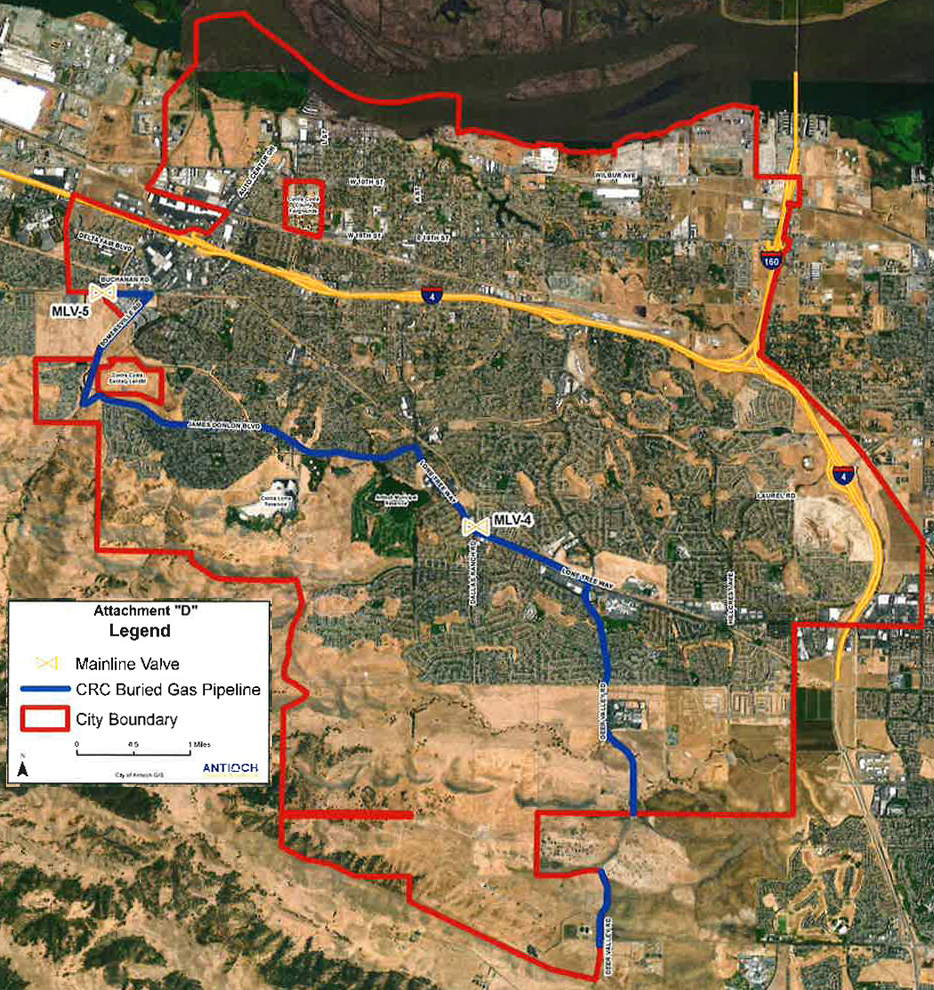











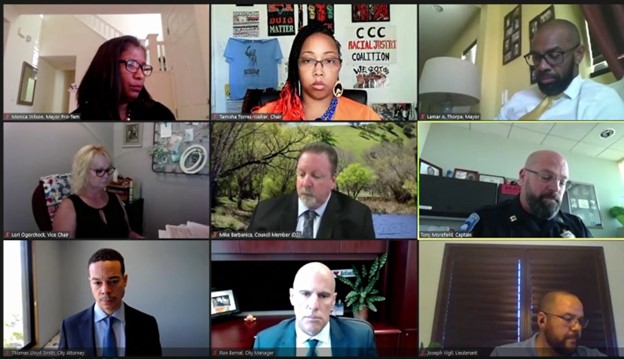

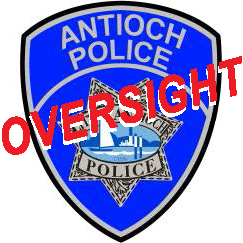 By Allen Payton
By Allen Payton